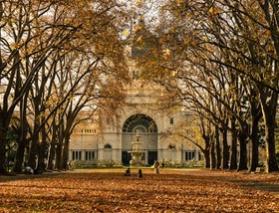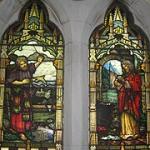
He sat among the king’s elite “priests”—listening. The king seemed anxious at the prisoner’s prediction of destruction and bondage, but the other priests demanded death. The prisoner was clearly a prophet: his face shone, and none could touch him until his message was finished. That message condemned the state of the kingdom—the king’s brutal and despicable wickedness, the people’s suffering, and the priests’ indulgent, sinful lives—along with explanation of commandments and powerful testimony of Jesus Christ. Despite its threat to him personally, he knew it was all true. Alma’s entire life was to undergo sacred change, eventually bringing sacred change to the Nephite nation.
The howling priests demanded martyrdom in flames. Abinadi “sealed the truth of his words by his death” (Mosiah 17:20). Hiding himself for several days, Alma wrote Abinadi’s words.
Changed Life
Disparaging change, some say “a leopard doesn’t change its spots.” But Alma was no leopard. God enabled him to understand truth and prophesy. Full-life sacred change was needed—and he did it.
Alma quickly grasped the truth, committed to it, and recognized/regretted his guilt. Recalling the wickedness of the king and priests, Alma later wrote, “I myself was caught in a snare, and did many things which were abominable in the sight of the Lord, which caused me sore repentance” (Mosiah 23:9).
Alma started privately teaching Abinadi’s words. Many believed. Wicked kings don’t accept sacred change, so Alma and the other believers met in secret near a source of pure water (nice symbol), with trees available for hiding. Alma taught them of faith and repentance, leading to redemption, and they were prepared for baptism. “They clapped their hands for joy . . . This is the desire of our hearts.” Alma and convert Helam were baptized together, followed by approximately 204—all “filled with the grace of God” (Mosiah 18: 11-16).
They organized their church, based on teachings of Abinadi and other holy prophets. They met each others’ temporal and spiritual needs and experienced no contention. When the king’s spies found them and an army gathered, they were warned and departed—all 450 0f them.
The Lamanites burst in; the kingdom was destroyed, scattered, and forced into bondage; the king was burned alive by his subjects. Alma’s people continued in their sacred change, industrious and prosperous in their own new land and city. Alma refused his people’s request to be king—his changed life had no place for kingship. He consented to be their high priest; the people lived together in peace and righteousness. Their new lives were about as different as possible from the old kingdom.
Changed Heart
Life with sacred change requires hearts with sacred change. Christian advocate C. S. Lewis understood lives like Alma’s. “God, who foresaw your tribulation, has specifically armed you to go through it, not without pain but without stain.” The pain of Alma’s guilt and repentance did not stain the rest of his life. With sacred change in their lifestyles, values, and behavior, Alma and his people needed sacred change in their hearts. Alma’s son, also named Alma, wrote of his father, “according to his faith there was a mighty change wrought in his heart.”
Elder Paul V. Johnson explained,
The Lord performed the actual change. Alma was very clear about this. He said, “Behold, he changed their hearts.” They “humbled themselves and put their trust in the true and living God . . . [and] were faithful until the end . . . [and] were saved” [Alma 5:7,13].
Johnson concluded, “The people were willing to open their hearts and exercise faith, and then the Lord changed their hearts. And what a mighty change it was!”
A similar group change of converted hearts had been led by King Benjamin.
And they all called with one voice . . . the Spirit of the Lord Omnipotent . . . has wrought a mighty change in us, or in our heart that we have no more disposition to do evil, but to do good continually.
. . . . . .
And we are willing to enter into a covenant with our God to do his will, and to be obedient to his commandments . . . all the remainder of our days. (Mosiah 5:2-5)
The younger Alma’s close friend Ammon was to bring sacred change to the hearts of kingdoms of Lamanite converts. God does things like this with prophets and worthy converts. With changed hearts, no stain will remain.
Destiny of Sacred Change
Sacred change precedes miracles. Additional trials may precede greater miracles. As things were going well for Alma’s re-hearted converts, a marauding army of Lamanites appeared. A true test of sacred change—in character and in hearts—is reaction when lives are threatened. Alma told his people not to fear but to remember God. The scripture recorded, “Therefore they hushed their fears” (Mosiah 23:27-28). Most people might need hushing by others—they did not; David A. Bednar explained, their knowledge of God and faith in Him “empowered” them.
The Lamanite leader put an ex-priest enemy of Alma over them. Burdens were heavy, and anyone caught praying would die. But these were people with changed hearts: they “did pour out their hearts to [God]; and he did know the thoughts of their hearts.” God made the burdens light and their backs strong (L. Whitney Clayton).
God delivered the people from captivity. He put all the Lamanites into a deep sleep, and under His guidance Alma led them all to join the largest Nephite settlement—Zarahemla.
Mosiah, Zarahemla’s king, was righteous and wise. He proclaimed Alma high priest over all churches in the land—responsibility Alma continued throughout his life. The two were a formidable team for sacred change. Challenges came, but neither waivered in his faith. Alma is recognized as one of the “great missionaries of the Book of Mormon.” Before the end of his earth life, he was told that his calling and election in the next life was “sure.”













